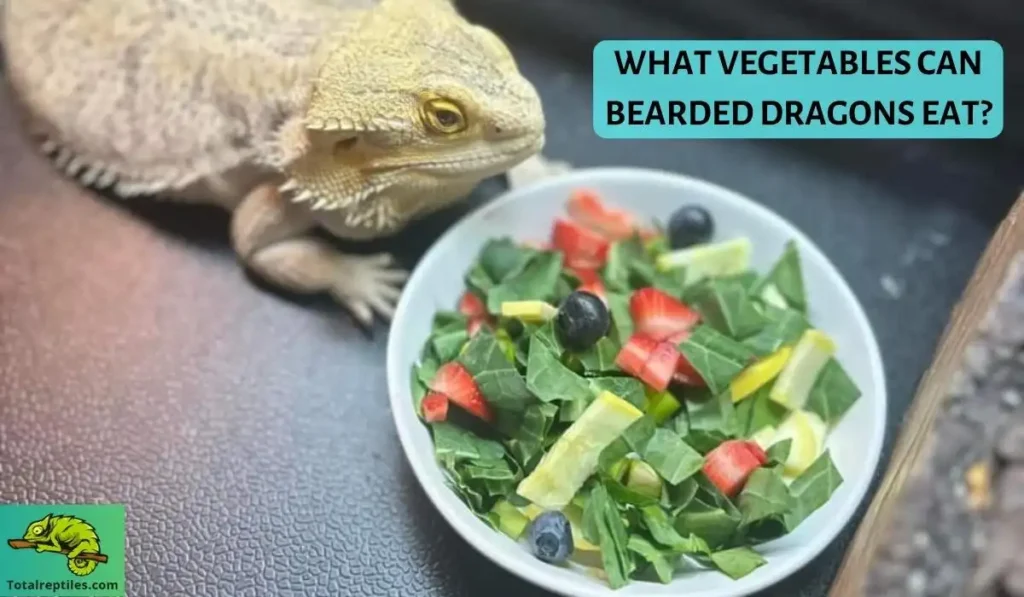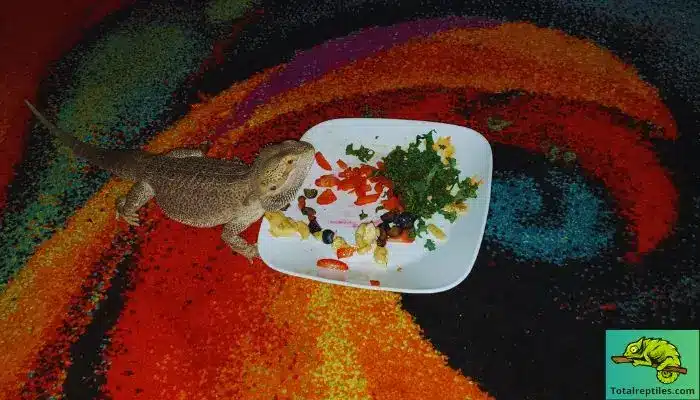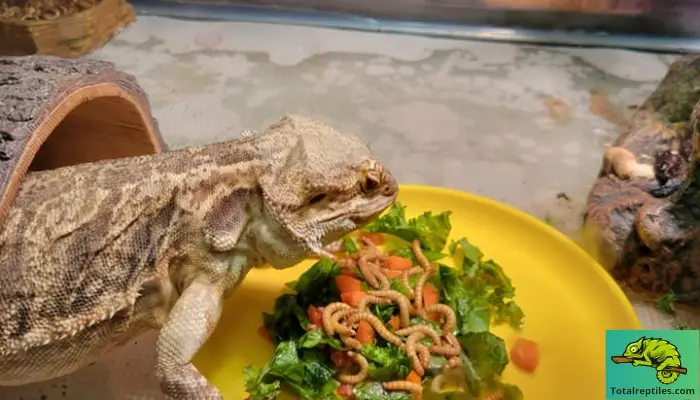Bearded dragons can consume a wide range of vegetables, including leafy greens like collard greens and vegetables like bell peppers, carrots, and squash. It’s important to avoid feeding them vegetables with high oxalates, such as spinach, and those with low nutritional value, like iceberg lettuce.
Bearded dragons, fascinating reptilian companions, have specific dietary needs.
Knowing the vegetables that form a crucial part of their nutrition is essential for their overall well-being. A balanced diet supports their growth, health, and energy levels.
Let me help you make the perfect list of veggies to feed bearded dragons. Let’s ensure your dragon gets a balanced and nourishing diet.

What Veggies Can Bearded Dragons Eat Every Day-
You can give them the following vegetables to your bearded dragon safely –
| Vegetable | Key Nutrients | Preparation |
| Acorn Squash | Vitamins A, C, B6; Potassium, Magnesium | Thoroughly cooked |
| Arugula | Vitamins A, C, K; Calcium, Iron | Occasional |
| Artichoke Hearts | Fiber, Antioxidants, Vitamin K | Cooked, no seasonings |
| Asparagus | Vitamins A, C, E, K; Calcium, Iron | Steamed or boiled |
| Bell Peppers | Vitamin C | Mix of colors |
| Butternut Squash | Vitamins A and C; Potassium, Fiber | Baked, steamed, boiled |
| Cabbage | Vitamins K, C; Goitrogenic (in moderation) | Occasional |
| Carrots | Beta-carotene (converted to Vitamin A) | Chopped or grated |
| Chicory | Vitamins A, C; Calcium, Potassium | Leafy green, raw |
| Collard Greens | Vitamins A, K; Calcium, Fiber | Regularly |
| Cucumber | Hydrating, Small amounts of vitamins & minerals | Occasional |
| Green Beans | Vitamins A, C, K; Calcium, Iron | Raw or lightly steamed |
| Pumpkin | Vitamins A and C; Potassium, Magnesium | Thoroughly cooked |
| Snow Peas | Vitamins A, C, K; Iron, Calcium | Raw or lightly steamed |
| Radicchio | Vitamins A, C, K; Calcium, Potassium | Moderation |
| Sweet Potatoes | Vitamins A, C; Dietary Fiber | Thoroughly cooked |
| Swiss Chard | Vitamins A, C, K; Calcium, Iron | Steamed or chopped |
| Turnips | Vitamins A and C; Calcium, Phosphorus | Cooked |
| Yellow Squash | Vitamins A and C; Potassium, Fiber | Steamed or cooked |
| Parsnips | Vitamins C, K; Calcium, Potassium | Cooked |
| Broccoli | Vitamins A, C; Calcium | Occasional, limited amount |
Let’s know more in-depth –

Arugula
Arugula, also known as rocket or roquette, is a leafy green vegetable from the Brassicaceae family. Its peppery and nutritious leaves can be a valuable addition to a bearded dragon’s diet.
Acorn Squash
Acorn squash is a tasty and nutritious food that can be added to a bearded dragon’s diet. It contains vitamins A, C, and B6 and minerals such as potassium and magnesium. Cut acorn squash into little pieces and boil it properly to avoid choking your dragon.
Artichoke Hearts
Artichoke hearts are a unique treat for bearded dragons due to their slightly bitter taste. They are high in fiber, antioxidants, and vitamin K. Make sure your dragon gets cooked artichoke hearts without extra oils or seasonings.
Asparagus
Bearded dragons can acquire vitamins A, C, E, and K from asparagus, calcium, and iron. Boil or steam asparagus to make it delicate and digestible for your scaly companion.
Bell Peppers
Bell peppers are vibrant and tasty for bearded dragons. They are rich in immune-boosting vitamin C. Offering a variety of bell pepper colors can supply various nutrients.
Butternut Squash
Butternut squash is another excellent vegetable choice for bearded dragons. It contains potassium, fiber, and vitamins A and C. Bake, steam, or boil butternut squash before feeding your dragon.
want to learn more about bearded dragon diet:
What insects do bearded dragons eat?
What plants bearded dragons can eat?
Cabbage
Cabbage is a leafy green vegetable that can be fed to bearded dragons in moderation. It contains essential minerals, including vitamins K and C, and goitrogenic compounds that might disrupt thyroid function if consumed in excess. Offer cabbage occasionally as part of a varied diet.
Carrots
Bearded dragons and other reptiles enjoy carrots. Beta-carotene, which is turned into vitamin A, is abundant in them and is suitable for skin and eyes. Chop or grate the carrots to make them easily manageable for your dragon.
Chicory
Chicory is a leafy green vegetable that offers an array of beneficial nutrients like vitamin A, vitamin C, calcium, and potassium. It also includes inulin, which functions as a type of prebiotic in bearded dragons, promoting a healthy stomach. Introduce chicory leaves into their diet for a delightful and nutritious treat.
Collard Greens
Collard greens are among the best vegetables for bearded dragons because of their nutritional value. Dietary fiber, calcium, and vitamins A and K are abundant. Regularly feeding your dragon collard greens can improve its health.
Cucumber
Cucumbers are hydrating and can be fed to bearded dragons sometimes. It is high in water but low in vitamins and minerals. Offer cucumber slices in moderation to add variety to their diet.
Green Beans
Green beans are a nutritious and crunchy vegetable that bearded dragons can enjoy. They contain vitamins A, C, and K, which support skin, eyesight, and blood coagulation.
Green beans contain calcium and iron, which support bone health and blood oxygenation. You can offer green beans raw or lightly steamed to retain their nutrients.
Pumpkin
Pumpkin is rich in vitamins and minerals for bearded dragons. Its vitamin A content boosts immunity and vision. Pumpkin also contains vitamin C, contributing to their overall well-being.
Additionally, it offers minerals like potassium and magnesium, which help regulate various bodily processes. When feeding pumpkin to your dragon, ensure it is cooked thoroughly to make it easily digestible.
Snow Peas
Sugar snap peas, or snow peas, are a tasty treat for bearded dragons. They provide vitamins A, C, and K for health and energy.
Snow peas contain iron and calcium, which boost blood oxygenation and bone health. You can offer raw or lightly steamed snow peas to make them easier to eat and digest.
Radicchio
Radicchio gives diversity to your bearded dragon’s diet and is nutritious. Vitamins A, C, and K help skin, immunity, and blood coagulation.
Radicchio supports bone and muscle health with calcium and potassium. Offer radicchio leaves in moderation to prevent excessive intake of certain compounds that may affect thyroid function if consumed in large amounts.
Sweet Potatoes
Sweet potatoes are a nutrient-rich root vegetable that can be beneficial for bearded dragons. They are full of vitamins A and C, which boost immunity and health.
Fiber in sweet potatoes assists digestion and prevents constipation. Cook sweet potatoes thoroughly for your dragon to make them digestible.
Swiss Chard
Swiss chard provides several nutrients for bearded dragons. The vitamins A, C, and K improve vision, immunity, and blood coagulation.
Calcium and iron in Swiss chard support bone health and blood oxygenation. Steam or chop the chard to make it suitable for your dragon’s consumption.
Turnips
Turnips are root vegetables that can be a valuable addition to your dragon’s diet. They offer vitamins A and C, supporting healthy skin and immune function. Turnips include calcium and phosphorus, which are needed for bone and energy development.
Your pet may have trouble chewing and digesting raw turnips, so soften them first.
Yellow Squash
Yellow squash is a safe and nutritious vegetable option for bearded dragons. It offers vitamins A and C, supporting their immune system and overall health.
Yellow squash also provides potassium and dietary fiber, contributing to their nutritional intake and digestive well-being. Steam or cook the yellow squash to make it easily digestible for your dragon.
Parsnips
Parsnips are root vegetables that can add variety to your bearded dragon’s diet. They provide vitamins C and K for immune support and blood clotting.
Parsnips also contain minerals like calcium and potassium, contributing to bone health and various bodily functions. Cook the parsnips before feeding them to your pet to soften their texture for easier consumption.
Broccoli
Broccoli florets can be offered to bearded dragons occasionally as a treat. They are rich in vitamins A and C, supporting their immune system and overall health. Broccoli also contains calcium, contributing to their bone health.
However, it’s essential to offer broccoli in moderation due to its goitrogenic properties, which may interfere with thyroid function if overfed.
Tips For Feeding Bearded Dragons Vegetables
Properly feeding bearded dragons vegetables is crucial for their health and well-being. Follow these tips to ensure your scaly companion gets the most out of their nutritious and delicious vegetable diet:

● Wash vegetables thoroughly to remove pesticides and contaminants.
● Provide a variety of vegetables for optimal nutrient diversity.
● Chop or grate vegetables into bite-sized pieces for easy consumption.
● Steam or boil vegetables to make them more digestible.
● Avoid feeding high-oxalate vegetables like spinach in large quantities.
● Introduce new vegetables gradually to monitor any adverse reactions.
● Rotate vegetables to prevent picky eating habits.
● Remove uneaten vegetables after a feeding session to maintain cleanliness.
● Supplement their diet with calcium and multivitamins as advised by a veterinarian.
● Always provide fresh water for hydration alongside their vegetable meals.
What Vegetables Can Bearded Dragons Not Eat
There is no such vegetable that bearded dragons can’t eat. But some vegetables may have some risky elements for their health.
It is better to avoid these vegetables. Here is a list of these items that you may prevent from feeding to your bearded dragons.
● Spinach: High in oxalates, which can hinder calcium absorption and lead to metabolic bone disease.
● Rhubarb: Contains toxic compounds that can be harmful to bearded dragons.
● Avocado contains persin, which harms many species, including reptiles.
● Beets: High in oxalates, which may interfere with calcium metabolism.
● Cabbage: Contains goitrogens that can disrupt thyroid function if consumed excessively.
- Onion: Alliums contain compounds that can be harmful to bearded dragons.
Frequently Asked Questions
a. Can Bearded Dragons Eat Only Vegetables?
No, Bearded Dragons cannot grow on a diet of only vegetables. While they enjoy various veggies, they also require a balanced diet that includes insects and protein. In fact, about 80% of their diet should consist of insects, such as crickets, mealworms, and roaches,
while the remaining 20% can be made up of leafy greens and vegetables like collard greens, mustard greens, and butternut squash. This balanced approach ensures they get essential nutrients like protein and calcium.
b. Can bearded dragons eat frozen vegetables?
Absolutely, bearded dragons can consume frozen vegetables, but it’s crucial to thaw them thoroughly before serving. Frozen veggies offer a convenient way to provide variety in their diet. Just ensure they’re free from added seasonings or sauces, as plain, unseasoned options are best for their health.
c. Can bearded dragons eat cooked vegetables?
Certainly, bearded dragons can enjoy cooked vegetables as part of their diet. Ensuring they are thoroughly cooked and served plain without any seasoning, spices, or oils is essential. Some suitable options include cooked carrots, squash, and green beans. Always prioritize their safety and nutrition.
Conclusion
Understanding the right vegetables for bearded dragons is paramount to their health and happiness. These charming reptilian companions can benefit from a wide array of vegetables. They can offer essential nutrients that contribute to their growth and well-being.
Follow proper feeding practices and offer a balanced selection of vegetables. Thus, you can ensure our bearded dragons receive the best care possible.

